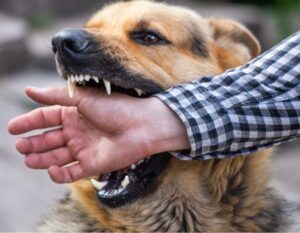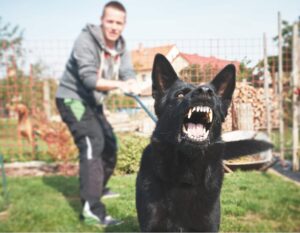Most dogs get along very well with humans—after all, they don’t call ‘em “man’s best friend” for nothing. That said, your seemingly harmless pup, with no history of aggression, may come to bite someone for any number of reasons. Most commonly:
- Your dog may sense a threat and feel the need to protect himself, the home, or the family.
- He may experience increased stress. Some dogs remain calm with most individuals, but feel anxiety around the mailman or small children, for example.
- He could act out because he’s in pain or injured.
- He may simply be frightened by something—a loud noise, another animal, or a rambunctious child are all possibilities.
You may also like to read:
Is Your Pet A Therapist in Disguise| Therapy Dogs,
Stop Your Puppy’s Chasing Behavior
Regardless of the reason, a dog bite is one of the most dreaded scenarios for a dog owner—and one that is certainly overwhelming for every party involved. According to Quick Statistics, Approximately 4.5 million dog bites occur each year in the United States. Nearly 1 out of 5 bites becomes infected and Dog attack victims suffer over $1 billion in monetary losses annually. JAMA reports this estimate to be as high as $2 billion
There is a basic protocol to follow if your dog bites someone, regardless of how serious or who you feel was at fault. Even if you think it could never happen with your dog, take the time now to learn what to do if he does bite or nip at someone.
Don’t panic. Remain calm and tend to the bite victim’s immediate needs, making sure your dog is kept at a safe distance or removed from the situation. If needed, see that the bite victim gets medical attention. Once you determine that he or she is physically ok, here’s what else you can do.
Avoid being defensive. Don’t argue, accuse, or make excuses for your dog’s behavior. Be considerate throughout the ordeal, as the victim may decide to hire a lawyer to pursue damages. Chances are that if you are pleasant and apologetic, the victim will go easier on both you and your dog.
Contact your veterinarian. If your dog’s bite broke the skin, you’ll need to obtain his medical records, as you may need to forward your dog’s rabies vaccination schedule on to the victim.
Talk to any witnesses if the bite was serious. Get names and contact information, as it’s likely that your version of events will differ somewhat from those of the victim, and independent witnesses often remember important details.
Offer to pay expenses. Good will often goes a long way. You may want to offer to pay for the victim’s direct medical costs—within reason, of course. This gesture can help in resolving the matter amicably, putting you in a better position if matters do escalate.
Talk to your insurance company. Some homeowners insurance policies will cover liability for dog bites. With more serious situations, call your insurer to inform them of the incident. The insurance company will likely appoint an adjuster to investigate the claim and, if necessary, a lawyer to defend you.
Research the laws in your state. More than half of U.S. states have laws that make dog owners liable almost any time their dog injures someone. Although commonly called dog-bite statutes, many of these laws cover all kinds of dog-inflicted injuries, not just bites.
Call an attorney. If you think you are not responsible—maybe your dog was provoked?—consult with a lawyer to get an idea of where you stand.
Prevention is key. This is probably the most important advice when it comes to liability for dog bites: Do all you can to prevent your dog from injuring others, especially small children. Here’s what the AKC recommends:
- Always use caution when introducing your dog to new situations. Be ready to respond to any signs that your dog is starting to feel uncomfortable, such as growling or backing away, and remove him promptly.
- Play non-aggressive games, such as fetch. Games like tug-of-war could ultimately encourage inappropriate behavior.
- Leash or fence in your dog. Always keep your pooch on a leash when in public. When out in the yard, it’s best to keep him safe in a fenced enclosure. While electronic fences may keep your dog in your yard, they do not keep people and animals from “hopping” the fence.
- Small children should never be left unsupervised with any dog (remember this?). Kids are so unpredictable in nature, that your dog should never in the situation where a curious or rambunctious child may unknowingly approach him.
If you are a dog lover then, Subscribe to our weekly newsletters. No Spams!














